UNIQUE – the «European Network for Innovation and Quality in Non Formal Education» – organised a seminar on methodologies of training trainers in European youth work.
It was storming!
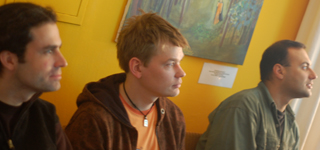
The seminar brought together 35 trainers and stakeholders in the Wannseeforum and provided – thanks to the support of SALTO, the National Agencies of Austria, Germany and the Netherlands, and the Youth Partnership – a great opportunity to critically review and explore the practice of training trainers.
We were neither short of ambitions – one of them to make a meaningful contribution to the development of a European strategy for training trainers – nor of questions to address, including these ones formulated by UNIQUE in the call for the gathering:
- What are the most essential skills of trainers?
- What are good methods to use in a To/fT?
- What is the role of the trainers vis-Ã -vis the participants?
- How do we deal with attitudes and/or values of trainers?
- What are our underlying educational theories and pedagogies?
- Do we make them explicit in the training?
- Shall we offer practice possibilities? If yes, how?
- What do we do with assessment? External, Self-assessment, by the team?

It was about time for such a seminar, I have to say. Already the chance to share own experiences and learn from others was worth every single minute; but the three days were rewarding and enriching for everyone much beyond this long-awaited and strongly-missed opportunity for exchange.
The political and institutional context give the seminar and its outcomes quite some attention – at a stakeholders meeting on training trainers in June 2007 in Budapest such an event was suggested and initiated (more on the meeting here and here), and the substantial support from three different agencies of the «Youth in Action» programme plus the SALTO Resource Centre on Training and the Youth Partnership (teamed up as so often, lately) show how much interest there is in further developing European-level strategies for training trainers.

The seminar started with a landing evening, during which we could get our hands dirty on clay – and play! We all had a good laugh trying to simulate a situation most of us dread during real-life parties… The one nasty question, short and sharp:
«So, what is it that you do?»
I learned a few sweet ideas to respond: being a trainer is like a romantic dinner – it may look easy, but unless everything is perfectly prepared it falls apart easily. Or: being a trainer means you are getting paid for playing – to pick just two. Now I can finally stop claiming I am an accountant (which fully guarantees no further questions, let me tell ya…)!
The next day began with sharing some of the questions each of us had brought along. Here are some that caught my attention:
- Why is there such a huge barrier between formal and non-formal education?
- Is non-formal education misused to maintain inequality in the world?
- Is being a trainer on European level a passion or a profession?
- Is training one of the keys for development?
- What culture of training are we creating?
- If we train trainers – who trains us?
- When is training not needed?

We continued by exploring specificities of courses for training trainers – things we considered especially important, but which may well exist in other training situations and are by no means exclusive characteristics of trainer-trainings. Some of these specificities addressed the relations between participants and team – and the unusual and intense exposure of team members under scrutiny by the trainers-to-be. Others focused on contents or methodology, for example outlining the extraordinary depth in which issues are usually explored.
Considerable time was spent to identify controversial areas – high voltage issues we called them – and to attempt substantial clarification of the high voltage themes by formulating clear and concise questions, including:
- How do you design methodologies flexible enough to adapt to changing realities?
- How do we get better at supporting people in exploring learning?
- How can individual experiences be of more benefit to the group?
- What is personal development in a training context?
- How can you cope with power struggles in training?
- Are trainers ready for self-assessment?
- Do we need minimum competences?
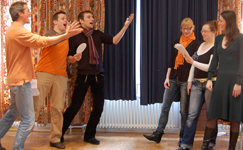
It was decisively more complicated to identify possible methodological responses to these high voltage issues – some of them dilemmas, others controversies, and some even a catch-22. But we worked hard and came up with a wide range of ideas and proposals – from learning to competences, from self-assessment to personal development. I want to leave the presentation of these ideas to the seminar documentation, though, because I could – right now – only give you a partial overview that couldn’t do justice to the work of all 35 colleagues.
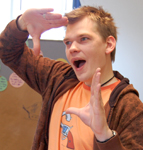
On the last day, we also spent some time exploring the roles of trainers and the competences of trainer-teams in training-trainers situations. We danced and sang and sculptured away about the different roles and their diverse understandings, which was quite fun but not conclusive – and I did not expect that; so while some people seemed to be slightly irritated about that, I was quite happy with the mixture of entertainment and provocation.

The discussion about team competences leaves me less convinced, though… I am almost as skeptical as our seminar-baby Hanna about what we produced there, and remain unsure about the results and how I would like to see them used (if at all). But the approach – to look at competences of an entire team rather than the competences of each individual team member on their own – is very useful, because it respects the common-sensical (and yet, somehow philosophical) notion that a team is much more than the sum of the competences of every individual member.
Ah, so much to think about!
So, great thanks to UNIQUE and Daca, Mark, and Peter!
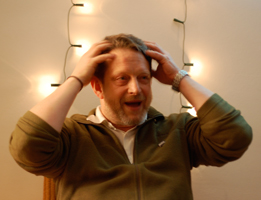

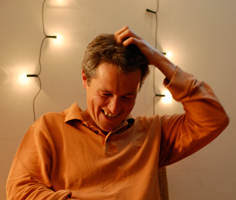
Comments
2 responses to “Well formed and performed”
Some photographic impressions.
Chalkdust101 picks up the item of educational heroes.